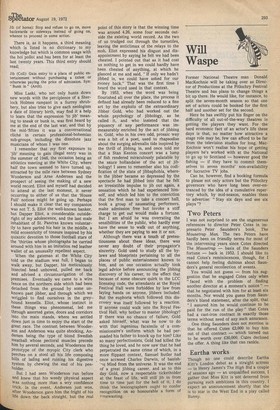Wil l Wasp e
Former National Theatre man Donald MacKechnie will be taking over as Director of Productions at the Pitlochry Festival Theatre and has plans to change things a bit up there. He would like, for instance, to split the seven-month season so that one set of actors could be booked for the first half and another set for the second.
Here he has swiftly put his finger on the difficulty of all out-of-the-way theatres in getting the players they want. For the hard economic fact of an actor's life these days is that, no matter how attractive a stage role may be, few can afford to be far from the television studios for long. MacKechnie won't realise his hope of getting players he's worked with at the National to go up to Scotland — however good the fishing — if they have to commit themselves to seven months' non-availability for lucrative TV jobs.
Can he, however, find a booking formula to please not only actors but the Pitlochry governors who have long been over-entranced by the idea of a cumulative repertory which, by mid-season, enables them to advertise: "Stay six days and see six plays "?
Two Peters
I was not surprised to see the ungenerous references to director Peter Cotes in impresario Peter Saunders's book, The Mousetrap Man. The two Peters have hardly been on friendly terms for most of the intervening years since Cotes directed The Mousetrap — basis of the Saunders fortune — back in 1952. I should like to read Cotes's reminiscences, though, for I cannot help feeling dubious about Saunders's general recollection of events.
You would not guess — from his suggestion that he engaged Cotes only when "faced with the problem of finding another director at a moment's notice" — that he negotiated with him for at least six months. Nor would you guess from Saunders's bland statement, after the split, that "I assured him he would continue to be paid for the run of the play" that Cotes had a cast-iron contract in exactly those terms without need of any such assurance.
One thing Saunders does not mention is that he offered Cotes £2,000 to buy him out of that contract — which turned out to be worth over £30,000. Cates declined the offer. A thing like that can rankle.
Eartha works
Though no one could describe Eartha Kitt's London debut as a straight actress — in Henry James's The High Bid a couple of seasons ago — an unqualified success, I gather that Miss Kitt is not deterred from pursuing such ambitions in this country. I expect an announcement shortly that she is to star in the West End in a play called Bunny.
































 Previous page
Previous page